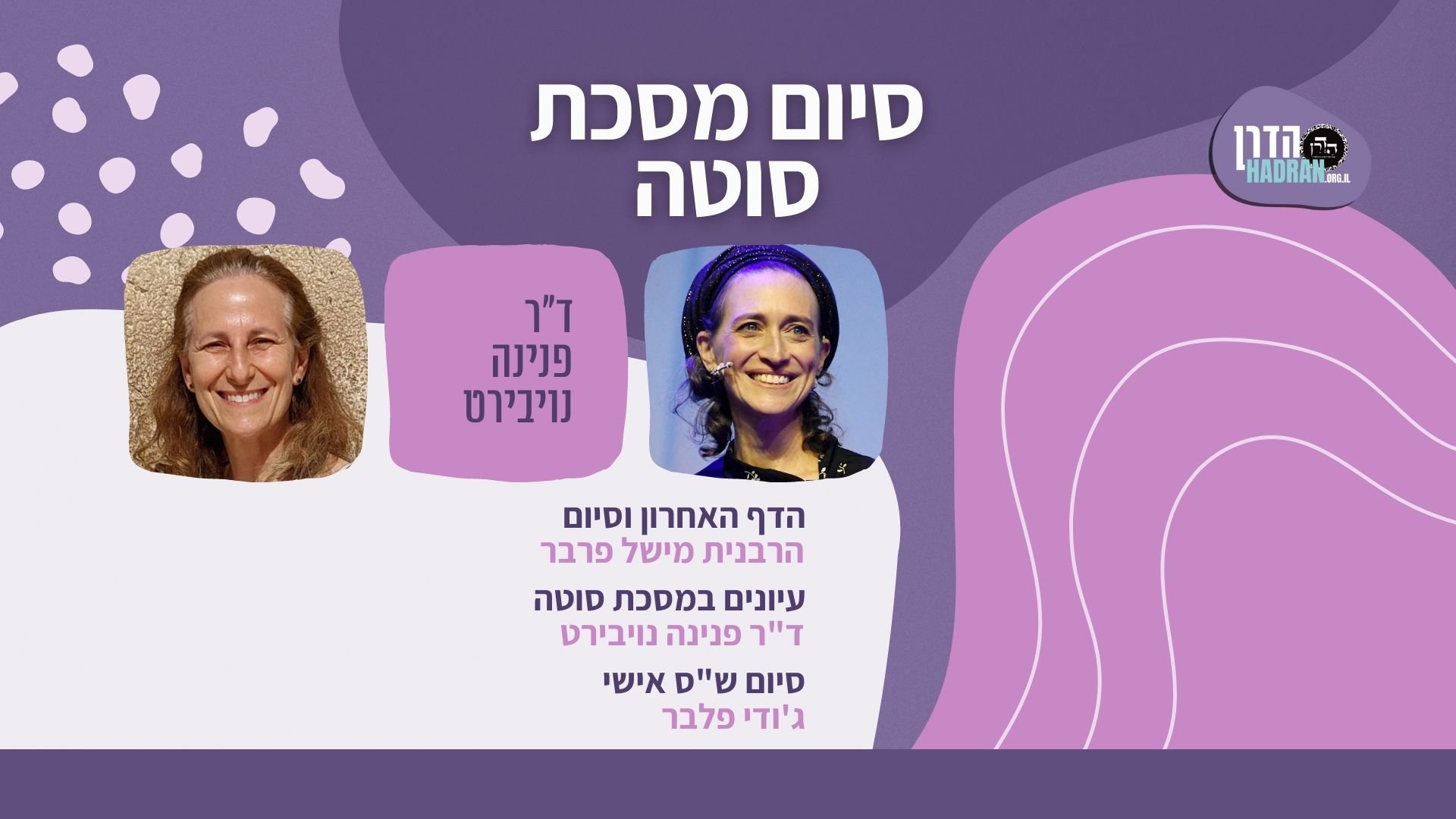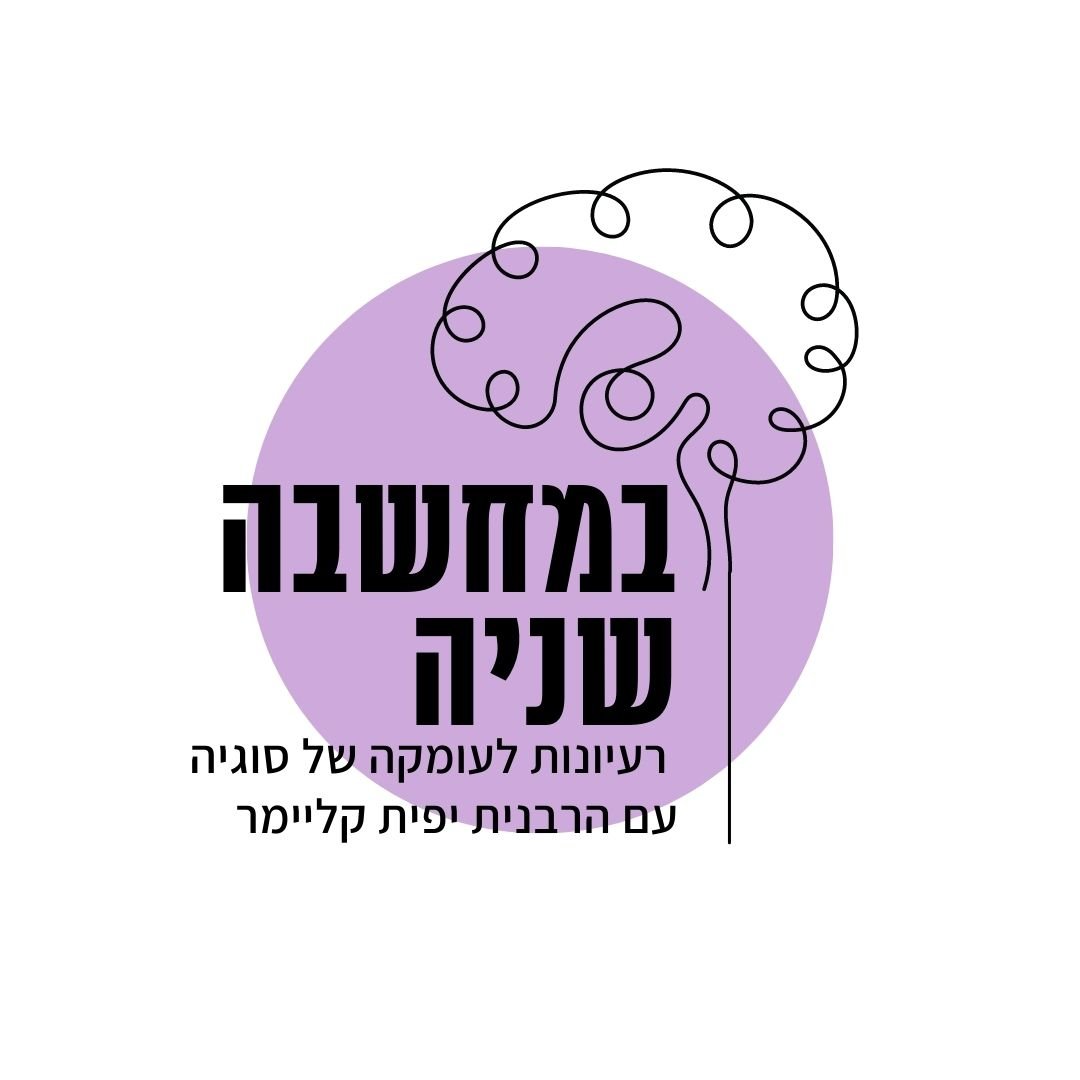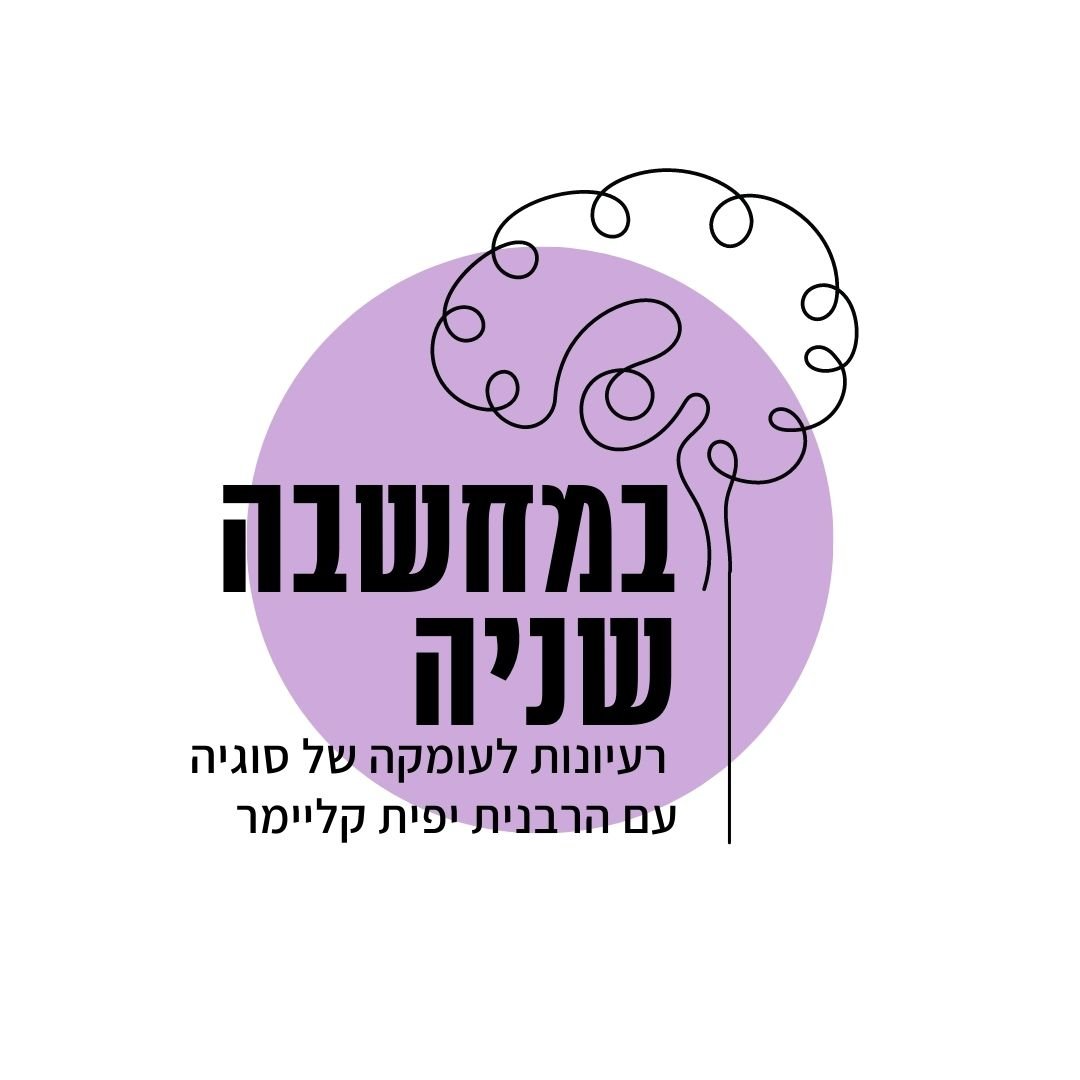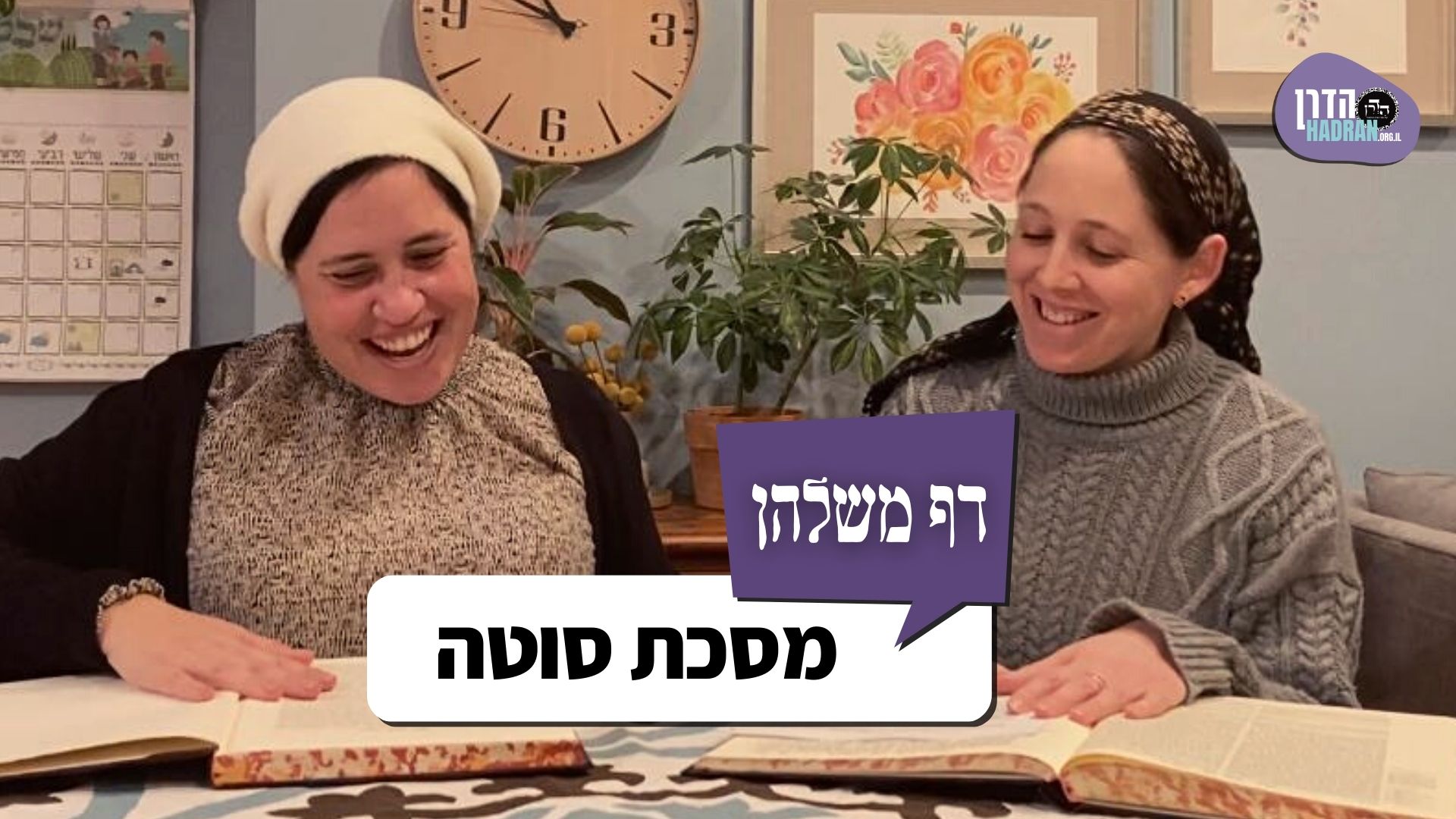סוטה יח
כְּתָבָהּ עַל שְׁנֵי דַּפִּין — פְּסוּלָה. ״סֵפֶר״ אֶחָד אָמַר רַחֲמָנָא, וְלֹא שְׁנַיִם וּשְׁלֹשָׁה סְפָרִים.
If one wrote the scroll on two unattached pages, it is unfit, as the Merciful One states in the Torah: “Scroll,” in the singular. It must be written on one scroll and not on two or three scrolls.
כָּתַב אוֹת אַחַת וּמָחַק אוֹת אַחַת, וְכָתַב אוֹת אַחַת וּמָחַק אוֹת אַחַת — פְּסוּלָה, דִּכְתִיב: ״וְעָשָׂה לָהּ הַכֹּהֵן אֵת כׇּל הַתּוֹרָה הַזֹּאת״.
If one wrote one letter and erased that one letter in water, and he then wrote one more letter and erased that one letter, it is unfit, as it is written: “And the priest shall execute upon her all this law” (Numbers 5:30). The entire passage must be written completely and only then erased, all at once.
בָּעֵי רָבָא: כָּתַב שְׁתֵּי מְגִילּוֹת לִשְׁתֵּי סוֹטוֹת, וּמְחָקָן לְתוֹךְ כּוֹס אֶחָד, מַהוּ? כְּתִיבָה לִשְׁמָהּ בָּעֵינַן, וְהָאִיכָּא, אוֹ דִילְמָא בָּעֵינַן נָמֵי מְחִיקָה לִשְׁמָהּ?
§ Rava raised a dilemma: If one wrote two scrolls for two separate sota women but then erased both of the scrolls in one cup, what is the halakha? Do we require that only the writing be performed for the sake of a specific woman, in which case that is accomplished here? Or perhaps we require that also the erasure be performed for the sake of a specific woman, which is not accomplished here, since both scrolls are erased together?
וְאִם תִּמְצָא לוֹמַר בָּעֵינַן נָמֵי מְחִיקָה לִשְׁמָהּ, מְחָקָן בִּשְׁתֵּי כוֹסוֹת וְחָזַר וְעֵירְבָן, מַהוּ? מְחִיקָה לִשְׁמָהּ בָּעֵינַן, וְהָאִיכָּא, אוֹ דִילְמָא הָא לָאו דִּידַהּ קָא שָׁתְיָא וְהָא לָאו דִּידַהּ קָא שָׁתְיָא?
And if you say that we require that also the erasure be for the sake of each specific woman, then if the priest erased them in two different cups and afterward mixed the water from both together again, what is the halakha? Do we require that only the erasure be for the sake of a specific woman, in which case that is accomplished here? Or perhaps since this sota does not drink from only her own water and that sota does not drink from only her own water, the water is disqualified?
וְאִם תִּמְצָא לוֹמַר הָא לָאו דִּידַהּ קָא שָׁתְיָא וְהָא לָאו דִּידַהּ קָא שָׁתְיָא, חָזַר וְחִלְּקָן, מַהוּ? יֵשׁ בְּרֵירָה, אוֹ אֵין בְּרֵירָה? תֵּיקוּ.
And furthermore, if you say that the water is disqualified because this one does not drink from only her own water and that one does not drink from only her own water, what if after mixing the two cups of water together the priest divided them again into two cups and gave one to each? What is the halakha then? Is there retroactive clarification, in which case one may claim that each woman drank her own water, or is there no retroactive clarification? The Gemara responds: The dilemma shall stand unresolved.
בָּעֵי רָבָא: הִשְׁקָהּ בְּסִיב, מַהוּ? בִּשְׁפוֹפֶרֶת, מַהוּ? דֶּרֶךְ שְׁתִיָּה בְּכָךְ, אוֹ אֵין דֶּרֶךְ שְׁתִיָּה בְּכָךְ? תֵּיקוּ.
Rava raised a dilemma: If the priest administered the bitter water to the sota to drink through a palm fiber, what is the halakha? Or if he administered it through a tube, what is the halakha? Is this considered a normal manner of drinking, or is it not considered a normal manner of drinking, in which case the act is invalid? The Gemara responds: The dilemma shall stand unresolved.
בָּעֵי רַב אָשֵׁי: נִשְׁפְּכוּ מֵהֶן וְנִשְׁתַּיְּירוּ מֵהֶן, מַהוּ? תֵּיקוּ.
Rav Ashi raised a dilemma: If some of the water of the sota spilled out and some of it remained in the cup, what is the halakha? Is it sufficient for the woman to drink some of the water in which the scroll has been erased or must she drink all of it? The Gemara responds: The dilemma shall stand unresolved.
אָמַר רַבִּי זֵירָא אָמַר רַב: שְׁתֵּי שְׁבוּעוֹת הָאֲמוּרוֹת בַּסּוֹטָה. לָמָּה? אַחַת קוֹדֶם שֶׁנִּמְחֲקָה מְגִילָּה, וְאַחַת לְאַחַר שֶׁנִּמְחֲקָה.
§ Rabbi Zeira says that Rav says: With regard to the two oaths that are stated with regard to the sota: “And the priest shall cause her to swear” (Numbers 5:19), and: “Then the priest shall cause the woman to swear with the oath of cursing” (Numbers 5:21), why are they both necessary? One must be administered before the scroll is erased and one must be administered after it is erased.
מַתְקֵיף לַהּ רָבָא: תַּרְוַיְיהוּ קוֹדֶם שֶׁנִּמְחֲקָה מְגִילָּה כְּתִיבָן? אֶלָּא אָמַר רָבָא: אַחַת שְׁבוּעָה שֶׁיֵּשׁ עִמָּהּ אָלָה, וְאַחַת שְׁבוּעָה שֶׁאֵין עִמָּהּ אָלָה.
Rava objects to this: Both of the oaths are written in the Torah before any mention of the scroll being erased. What is the basis to claim that one oath was administered afterward? Rather, Rava said: While both oaths are administered before the sota drinks, the two oaths are different: One is an oath that has a curse with it, and one is an oath that does not have a curse with it.
הֵיכִי דָּמֵי שְׁבוּעָה שֶׁיֵּשׁ עִמָּהּ אָלָה? אָמַר רַב עַמְרָם אָמַר רַב: ״מַשְׁבִּיעַנִי עָלַיִךְ שֶׁלֹּא נִטְמֵאת, שֶׁאִם נִטְמֵאת יָבוֹאוּ בִּיךְ״.
The Gemara asks: What are the circumstances of an oath that has a curse with it? What is the language of this oath? Rav Amram says that Rav says: The priest says: I administer an oath to you that you are honest in your claim that you were not defiled, as, if you were defiled, all these curses will come upon you.
אָמַר רָבָא: אָלָה לְחוֹדַהּ קָיְימָא וּשְׁבוּעָה לְחוֹדַהּ קָיְימָא! אֶלָּא אָמַר רָבָא: ״מַשְׁבִּיעַנִי עָלַיִךְ שֶׁאִם נִטְמֵאת יָבוֹאוּ בִּיךְ״.
Rava said: This is insufficient, as the curse stands by itself and the oath stands by itself. They are said in separate statements, and it cannot be considered to be an oath with a curse. Rather, Rava said: The priest says: I administer an oath to you that if you were defiled, all these curses will come upon you.
אָמַר רַב אָשֵׁי: אָלָה — אִיכָּא, שְׁבוּעָה — לֵיכָּא! אֶלָּא אָמַר רַב אָשֵׁי: ״מַשְׁבִּיעַנִי עָלַיִךְ שֶׁלֹּא נִטְמֵאת, וְאִם נִטְמֵאת יָבוֹאוּ בִּיךְ״.
Rav Ashi said: Even this is insufficient, as there is a curse but there is no oath that she was not defiled. Rather, Rav Ashi said: The priest must say: I administer an oath to you that you were not defiled and that if you were defiled all these curses will come upon you. Here the oath itself includes the curse.
מַתְנִי׳ עַל מָה הִיא אוֹמֶרֶת ״אָמֵן״ ״אָמֵן״ — אָמֵן עַל הָאָלָה, אָמֵן עַל הַשְּׁבוּעָה. אָמֵן מֵאִישׁ זֶה, אָמֵן מֵאִישׁ אַחֵר. אָמֵן שֶׁלֹּא שָׂטִיתִי אֲרוּסָה וּנְשׂוּאָה
MISHNA: With regard to what does she say: “Amen, amen” (Number 5:22), twice, as recorded in the verse? The mishna explains that it includes of the following: Amen on the curse, as she accepts the curse upon herself if she is guilty, and amen on the oath, as she declares that she is not defiled. She states: Amen if I committed adultery with this man about whom I was warned, amen if I committed adultery with another man. Amen that I did not stray when I was betrothed nor after I was married,
וְשׁוֹמֶרֶת יָבָם, וּכְנוּסָה. אָמֵן שֶׁלֹּא נִטְמֵאתִי, וְאִם נִטְמֵאתִי — יָבוֹאוּ בִּי.
nor as a widow waiting for my yavam to perform levirate marriage, since a woman at that stage is prohibited from engaging in sexual intercourse with any men, nor when married through levirate marriage to the yavam; amen that I did not become defiled, and if I did become defiled, may all these curses come upon me.
רַבִּי מֵאִיר אוֹמֵר: אָמֵן שֶׁלֹּא נִטְמֵאתִי, אָמֵן שֶׁלֹּא אֶטָּמֵא.
Rabbi Meir says that “amen, amen” means: Amen that I did not become defiled in the past, amen that I will not become defiled in the future.
הַכֹּל שָׁוִין שֶׁאֵין מַתְנֶה עִמָּהּ, לֹא עַל קוֹדֶם שֶׁתִּתְאָרֵס וְלֹא עַל אַחַר שֶׁתִּתְגָּרֵשׁ.
All agree that he may stipulate with her through this oath neither with regard to what she did before becoming betrothed to him, nor with regard to what she will do after she becomes divorced from him.
נִסְתְּרָה לְאֶחָד וְנִטְמֵאת, וְאַחַר כָּךְ הֶחְזִירָה — לֹא הָיָה מַתְנֶה עִמָּהּ.
Similarly, if a husband divorced his wife, and while divorced she secluded herself with another man and became defiled, and afterward her husband took her back and remarried her, and he then warned her about a specific man, and she secluded herself, and she is now about to drink the water of the sota, he cannot stipulate with her that she take an oath that she did not become defiled during the period in which she was divorced. This is because her husband would become forbidden to her only if she had married another man after being divorced, not if she merely committed an act of promiscuity.
זֶה הַכְּלָל: כׇּל שֶׁתִּבָּעֵל וְלֹא הָיְתָה אֲסוּרָה לוֹ — לֹא הָיָה מַתְנֶה עִמָּהּ.
This is the principle: In every case where if she would engage in sexual intercourse with someone else she would not become forbidden to her husband due to this act, he may not stipulate with her that her oath include that act. The oath can include only cases in which she would be rendered forbidden to him.
גְּמָ׳ אָמַר רַב הַמְנוּנָא: שׁוֹמֶרֶת יָבָם שֶׁזִּינְּתָה — אֲסוּרָה לִיבָמָהּ. מִמַּאי — מִדְּקָתָנֵי שׁוֹמֶרֶת יָבָם וּכְנוּסָה.
GEMARA: Rav Hamnuna says: In the case of a widow awaiting her yavam who committed adultery, she becomes forbidden to her yavam. From where is this derived? It is from the fact that the mishna teaches: Nor as a widow waiting for my yavam to perform levirate marriage, nor when married through levirate marriage.
אִי אָמְרַתְּ בִּשְׁלָמָא אֲסִירָה — מִשּׁוּם הָכִי מַתְנֵה בַּהֲדַהּ, אֶלָּא אִי אָמְרַתְּ לָא אֲסִירָה — הֵיכִי מַתְנֵה בַּהֲדַהּ? וְהָתְנַן, זֶה הַכְּלָל: כֹּל שֶׁאִילּוּ תִּיבָּעֵל וְלֹא תְּהֵא אֲסוּרָה לוֹ — לֹא הָיָה מַתְנֶה עִמָּהּ!
The Gemara explains: Granted, if you say that a woman awaiting levirate marriage who committed adultery is forbidden to the yavam, due to that reason a husband may stipulate with a sota that she take an oath that she did not commit adultery while she was awaiting levirate marriage with him. But if you say that such a woman does not become forbidden, how can a husband stipulate this with her? But didn’t we learn in the mishna that this is the principle: In every case where if she would engage in sexual intercourse with someone else she would not become forbidden to her husband due to this act, he may not stipulate with her that her oath include that act? Clearly she must become forbidden to the yavam if she commits adultery.
אָמְרִי בְּמַעְרְבָא: לֵית הִילְכְתָא כְּרַב הַמְנוּנָא.
They say in the West, Eretz Yisrael: The halakha is not in accordance with the opinion of Rav Hamnuna. A woman awaiting levirate marriage who commits adultery does not become forbidden to the yavam.
אֶלָּא הָא דְּקָתָנֵי ״שׁוֹמֶרֶת יָבָם וּכְנוּסָה״ — הָא מַנִּי רַבִּי עֲקִיבָא הִיא, דְּאָמַר: אֵין קִידּוּשִׁין תּוֹפְסִין בְּחַיָּיבֵי לָאוִין, וּמְשַׁוֵּי לַהּ כִּי עֶרְוָה.
The Gemara asks: But with regard to that which is taught in the mishna: Nor as a widow waiting for my yavam to perform levirate marriage, nor when married through levirate marriage, in accordance with whose opinion is this? It is in accordance with the opinion of Rabbi Akiva, who says: Betrothal does not take effect even for those who would be merely liable for violating ordinary prohibitions were they to be married. All agree that betrothal does not take effect for forbidden unions that carry the punishment of karet, e.g., unions between siblings. However, according to Rabbi Akiva, in matters of personal status an ordinary Torah prohibition is equivalent to prohibitions that carry the punishment of karet. And he therefore holds that just as a wife who commits adultery, rendering her liable to receive karet, is forbidden to her husband and must be divorced, so too, a widow awaiting her yavam who commits adultery, violating an ordinary Torah prohibition, is considered to be a woman forbidden to her yavam.
בָּעֵי רַבִּי יִרְמְיָה: מַהוּ שֶׁיַּתְנֶה אָדָם עַל נִישּׂוּאִין הָרִאשׁוֹנִים, עַל נִישּׂוּאֵי אָחִיו, מַהוּ?
Rabbi Yirmeya raised a dilemma: If a man divorced his wife and then remarried her, and she then secluded herself and came to drink the water of a sota, what is the halakha as to whether a man in that situation may stipulate with her concerning their first marriage? May he compel her to include in her oath that she did not commit adultery then either? Similarly, may a yavam stipulate with his yevama concerning the marriage of his brother, requiring her to attest that she did not commit adultery prior to the brother’s death? What is the halakha?
תָּא שְׁמַע, זֶה הַכְּלָל: כֹּל שֶׁתִּיבָּעֵל וְלֹא תְּהֵא אֲסוּרָה לוֹ — לֹא הָיָה מַתְנֶה עִמָּהּ. הָא אֲסִירָה — הָכִי נָמֵי דְּמַתְנֶה. שְׁמַע מִינַּהּ.
The Gemara proposes: Come and hear evidence from the conclusion of the mishna: This is the principle: In every case where if she would engage in sexual intercourse with someone else she would not become forbidden to her husband due to this act, he may not stipulate with her that her oath include that act. One may therefore infer that he may indeed stipulate with her concerning any case in which she would become forbidden. In both of the cases in question the woman would have become forbidden to her husband if she had been guilty. Therefore, the Gemara concludes: Indeed, conclude from the mishna that he is entitled to stipulate in these cases.
רַבִּי מֵאִיר אוֹמֵר: אָמֵן שֶׁלֹּא נִטְמֵאתִי וְכוּ׳. תַּנְיָא: לֹא כְּשֶׁאָמַר רַבִּי מֵאִיר אָמֵן שֶׁלֹּא אֶטָּמֵא שֶׁאִם תִּטָּמֵא מַיִם בּוֹדְקִין אוֹתָהּ מֵעַכְשָׁיו, אֶלָּא: לִכְשֶׁתִּטָּמֵא — מַיִם מְעַרְעֲרִין אוֹתָהּ וּבוֹדְקִין אוֹתָהּ.
§ The mishna states: Rabbi Meir says that “amen, amen” means: Amen that I did not become defiled in the past, amen that I will not become defiled in the future. With regard to this it is taught in a baraita (Tosefta 2:2): When Rabbi Meir said: Amen that I will not become defiled in the future, he did not mean to say that if God knows that she will become defiled in the future, the water that she drinks now evaluates whether she will be unfaithful and passes judgment on her from now. Rather, he meant that in the event that she becomes defiled in the future, the water that she drinks now will destabilize her and evaluate then whether she was unfaithful.
בָּעֵי רַב אָשֵׁי: מַהוּ שֶׁיַּתְנֶה אָדָם עַל נִישּׂוּאִין הָאַחֲרוֹנִים? הַשְׁתָּא מִיהָא לָא אֲסִירָה לֵיהּ, אוֹ דִילְמָא זִימְנִין דִּמְגָרֵשׁ לַהּ וַהֲדַר מַהְדַּר לַהּ?
Rav Ashi raised a dilemma: What is the halakha as to whether a man may stipulate with his wife concerning a later marriage, in the event that he would divorce her and then remarry her? Do we say: Now, at least, if she remains faithful during this marriage, she is not forbidden to him? Or perhaps this includes a later marriage, as sometimes a man divorces his wife and remarries her, and if she then commits adultery she will become forbidden to him.
תָּא שְׁמַע: הַכֹּל שָׁוִין שֶׁלֹּא הָיָה מַתְנֶה עִמָּהּ לֹא עַל קוֹדֶם שֶׁתִּתְאָרֵס, וְלֹא עַל אַחַר שֶׁתִּתְגָּרֵשׁ. נִסְתְּרָה לְאֶחָד וְנִטְמֵאת, וְאַחַר כָּךְ יַחְזִירֶנָּה — לֹא הָיָה מַתְנֶה. הָא יַחְזִירֶנָּה וְתִיטָּמֵא, הָכִי נָמֵי דְּמַתְנֵי. שְׁמַע מִינַּהּ.
The Gemara answers: Come and hear evidence from the mishna: All agree that he may stipulate with her through this oath neither with regard to what she did before becoming betrothed to him, nor with regard to what she will do after she becomes divorced from him. And if while divorced she secluded herself with another man and became defiled, and afterward her husband took her back and remarried her, he may not stipulate with her with regard to the period in which she was divorced, since that act does not render her forbidden to him. The Gemara infers: But if he remarries her and she then becomes defiled, she would be forbidden to him. Therefore, he may indeed stipulate with her in advance with regard to this. The Gemara states: Indeed, conclude from the mishna that this is so.
תָּנוּ רַבָּנַן: ״זֹאת תּוֹרַת הַקְּנָאֹת״, מְלַמֵּד שֶׁהָאִשָּׁה שׁוֹתָה וְשׁוֹנָה.
§ The Sages taught: The verse states: “This is the law of jealousy” (Numbers 5:29), indicating that the same law is to be carried out in all cases of jealousy. This teaches that the woman drinks and repeats, i.e., she must drink a second time if she becomes a sota again.
רַבִּי יְהוּדָה אוֹמֵר: ״זֹאת״, שֶׁאֵין הָאִשָּׁה שׁוֹתָה וְשׁוֹנָה. אָמַר רַבִּי יְהוּדָה: מַעֲשֶׂה וְהֵעִיד לְפָנֵינוּ נְחוּנְיָא חוֹפֵר שִׁיחִין שֶׁהָאִשָּׁה שׁוֹתָה וְשׁוֹנָה, וְקִיבַּלְנוּ עֵדוּתוֹ בִּשְׁנֵי אֲנָשִׁים, אֲבָל לֹא בְּאִישׁ אֶחָד.
The baraita continues: Rabbi Yehuda says: The word “this” in the verse is a restricting term, indicating that the woman does not drink and repeat. Rabbi Yehuda said: There was an incident in which Neḥunya the ditch digger testified before us in the name of his teachers that the woman drinks and repeats, and we accepted his testimony with regard to two men, but not with regard to one man. Even if she drinks the water of a sota while married to her first husband, she must drink again after violating a warning by her second husband. However, one husband cannot have his wife drink twice.
וַחֲכָמִים אוֹמְרִים: אֵין הָאִשָּׁה שׁוֹתָה וְשׁוֹנָה, בֵּין בְּאִישׁ אֶחָד בֵּין בִּשְׁנֵי אֲנָשִׁים.
The baraita concludes: And the Rabbis say: The woman does not drink and repeat, whether with regard to one man or with regard to two men.
וְתַנָּא קַמָּא נָמֵי, הָכְתִיב ״זֹאת״! וְרַבָּנַן בָּתְרָאֵי נָמֵי, הָא כְתִיב ״תּוֹרַת״!
The Gemara asks: But according to the first tanna of the baraita as well, isn’t it written in the verse: “This,” restricting the number of times a woman must drink? And according to the Rabbis mentioned later in the baraita as well, isn’t it written: “The law of jealousy,” amplifying the number of times a woman must drink to include all cases of jealousy?
אָמַר רָבָא: בְּאִישׁ אֶחָד וּבוֹעֵל אֶחָד — דְּכוּלֵּי עָלְמָא לָא פְּלִיגִי דְּאֵין הָאִשָּׁה שׁוֹתָה וְשׁוֹנָה,
Rava said: Different halakhot apply to different cases: With regard to one husband who accused his wife twice about one paramour, everyone agrees that the woman does not drink and repeat, having been proven innocent once,































